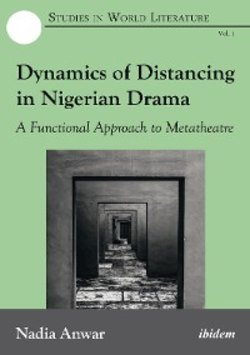Читать книгу Dynamics of Distancing in Nigerian Drama - Nadia Anwar - Страница 10
B. Metatheatre and Dramatic Distancing 1.3 Metatheatre: Conceptual Significance with regard to Distancing
ОглавлениеThe convention of foregrounding the illusive, fictive or theatrical nature of any dramatic enactment on stage is widely termed ‘metatheatricality’. The term is made up of two semantic units; the prefix ‘meta’ and its qualifying term ‘theatricality’. Here it is important to understand the dynamics of the prefix ‘meta’ and the way its etymological meaning has changed over the years. Although originally ‘meta’ was a Greek prefix which means ‘after’, ‘among’ or ‘with’, its evolutionary process in the English language has made it mean the same as one of its corresponding homonyms, ‘metaphysics’, which is commonly defined as ‘beyond physical’. However, epistemologically ‘meta’ as a prefix is used to mean ‘about’, signifying the knowledge of a phenomenon with regards to its own category or nature. Regardless of the transformation that has occurred in the semantic make-up of the prefix in question, its present position before ‘theatricality’ suggests both the knowledge of the dramatic presence of the dramaturgical content and its fictive quality. In other words, in a particular metatheatrical situation, a playwright not only creates a generic distance from his or her piece of work by making it the subject of his artistic creation but the fictive creation also produces a state of psychic distance in the audience. Since all forms of art emphasize the “art-character of Art” (Bullough 1912, 99), even if naturalistic or realistic, the distancing components of any theatrical production also forestall its “anti-realistic” nature.[13] Darko Suvin, while making a distinction between the mirroring and dynamic visions of art, argues that for Brecht art is “Dynamo”,[14] “an artistic and scenic vision which penetrates Nature's possibilities, which finds out the ‘co-variant’ laws of its processes, and makes it possible for critical understanding to intervene into them” (1967, 56–67). By connoting the meaning of ‘meta’ with distance or dynamic illusion its significance in any performance situation in general and contemporary Nigerian drama in particular can be underlined.
Metadrama[15] or metatheatre is widely regarded as drama about drama or theatre about theatre, producing self-conscious moments by which a play draws attention to its fictionality. In the context of theatre, self-consciousness implies those dislocating moments whereby audiences are made to comprehend the artifice of theatrical reality created on the stage. In other words, it suggests the conscious awareness of the distance that a play/drama constructs through its artistic medium. Dramatic elements and techniques such as direct address to the audience, prologues, asides, epilogues, chorus, textual and real-life referentiality, play-within-the play or play about a play, intertextual allusions and linguistic signifiers are all generally considered as metatheatrical or metadramatic techniques; hence, they are also devices to create distance. They not only refer to the illusive and theatrical nature of a performance but also reflect upon the art of playwriting itself and help in the dissolution of generic and theatrical boundaries.
In the context of Nigerian drama, an optimum balanced distance is created through metatheatrical techniques, whereby the audience is made both to appreciate the aesthetic value of the performance by realizing its artifice as well as reflect on different issues—the latter being an important aim of Brechtian theatre. However, significantly the “manner” and “degree” to which these metatheatrical techniques are employed can vary from one
